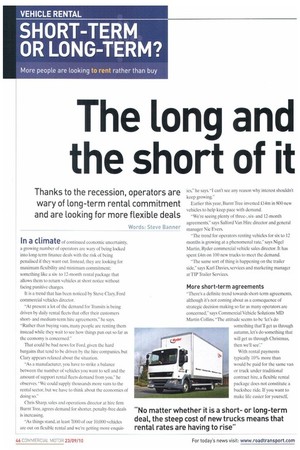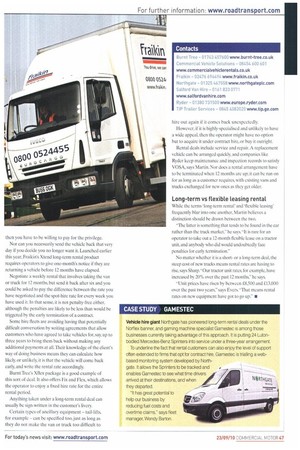The tong and the short of it
Page 46

Page 47

If you've noticed an error in this article please click here to report it so we can fix it.
Thanks to the recession, operators are wary of long-term rental commitment and are looking for more flexible deals
Words: Steve Banner In a climate of continued economic uncertainty, a growing number of operators are wary of being locked into long-term finance deals with the risk of being penalised if they want out. Instead, they are looking for maximum flexibility and minimum commitment; something like a sixto 12-month rental package that allows them to return vehicles at short notice without facing punitive charges.
It is a trend that has been noticed by Steve Clary, Ford commercial vehicles director.
At present a lot of the demand for Transits is being driven by daily rental fleets that offer their customers shortand medium-term hire agreements," he says. "Rather than buying vans, many people are renting them instead while they wait to see how things pan out so far as the economy is concerned."
That could be bad news for Ford, given the hard bargains that tend to be driven by the hire companies, but Clary appears relaxed about the situation.
"As a manufacturer, you have to strike a balance between the number of vehicles you want to sell and the amount of support rental fleets demand from you," he observes. "We could supply thousands more vans to the rental sector, but we have to think about the economics of doing so."
Chris Sharp, sales and operations director at hire firm Burnt 'Tree, agrees demand for shorter, penalty-free deals is increasing.
"As things stand, at least 7,000 of our 10,000 vehicles are out on flexible rental and we're getting more enquir ies," he says. "I can't see any reason why interest shouldn't keep growing."
Earlier this year, Burnt Tree invested Lim in 800 new vehicles to help keep pace with demand.
"We're seeing plenty of three-, sixand 12-month agreements," says Salford Van Hire director and general manager Nic Evers.
"The trend for operators renting vehicles for six to 12 months is growing at a phenomenal rate," says Nigel Martin, Ryder commercial vehicle sales director. It has spent £4m on 100 new trucks to meet the demand.
"The same sort of thing is happening on the trailer side," says Karl Davies, services and marketing manager at TIP Trailer Services.
More short-term agreements
"There's a definite trend towards short-term agreements, although it's not coming about as a consequence of strategic decision making so far as many operators are concerned," says Commercial Vehicle Solutions MD Martin Collins. "The attitude seems to be 'let's do something that'll get us through autumn, let's do something that will get us through Christmas, then we'll see."
With rental payments typically 10% more than would be paid for the same van or truck under traditional contract hire, a flexible rental package does not constitute a buckshee ride. If you want to make life easier for yourself, then you have to be willing to pay for the privilege.
Nor can you necessarily send the vehicle back that very day if you decide you no longer want it. Launched earlier this year, Fraikin's Xtend long-term rental product requires operators to give one-month's notice if they are returning a vehicle before 12 months have elapsed.
Negotiate a weekly rental that involves taking the van or truck for 12 months, but send it back after six and you could be asked to pay the difference between the rate you have negotiated and the spot-hire rate for every week you have used it. In that sense, it is not penalty-free either, although the penalties are likely to be less than would he triggered by the early termination of a contract.
Some hire fleets are avoiding having that potentially difficult conversation by writing agreements that allow customers who have agreed to take vehicles for, say, up to three years to bring them back without making any additional payments at all Their knowledge of the client's way of doing business means they can calculate how likely, or unlikely, it is that the vehicle will come back early, and write the rental rate accordingly.
Burnt Tree's Xflex package is a good example of this sort of deal. It also offers Fix and Flex, which allows the operator to enjoy a fixed hire rate for the entire rental period.
Anything taken under a long-term rental deal can usually be sign-written in the customer's livery.
Certain types of ancillary equipment tail-lifts, for example can be specified too, just as long as they do not make the van or truck too difficult to hire out again if it comes back unexpectedly.
However, if it is highly-specialised and unlikely to have a wide appeal, then the operator might have no option but to acquire it under contract hire, or buy it outright.
Rental deals include service and repair. A replacement vehicle can be arranged quickly, and companies like Ryder keep maintenance and inspection records to satisfy VOSA, says Martin. Nor does a rental arrangement have to be terminated when 12 months are up; it can be run on for as long as a customer requires, with existing vans and trucks exchanged for new ones as they get older.
Long-term vs flexible teasing rental
While the terms long-term rental' and 'flexible leasing' frequently blur into one another, Martin believes a distinction should be drawn between the two.
"The latter is something that tends to be found in the car rather than the truck market," he says. "It is rare for an operator to take out a 12-month flexible lease on a tractor unit, and anybody who did would undoubtedly face penalties for early termination."
No matter whether it is a shortor a long-term deal, the steep cost of new trucks means rental rates are having to rise, says Sharp. "Our tractor unit rates, for example, have increased by 20% over the past 12 months," he says.
"Unit prices have risen by between £8,500 and £13,000 over the past two years," says Evers. "That means rental rates on new equipment have got to go up." •
































































































































